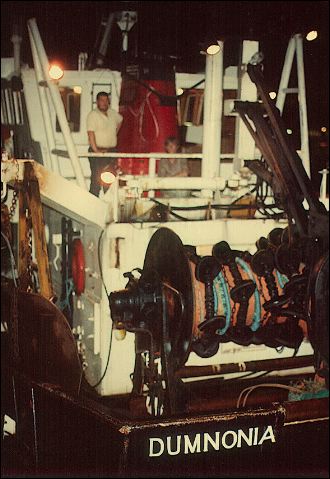The relationship is emulated particularly within west Cornwall. Both Brittany and England’s most westerly tips share a rich seafaring past; the two communities are very much built on the fishing industry.
 |
| Breton Fisheries consultant Yan Giron opened this year's Newlyn Fish Festival. |
This foremost comparison was highlighted recently at the Newlyn Fish Festival. Not only was it opened by Breton fisheries consultant Yan Giron, who spoke of the bond between the two Celtic cousins, but also by the presence of two crêpe stands alongside the other fare.
Indeed these two culturally-defining foods contribute to the regions’ respective fame - and were up until recently a standout difference between the Channel-divided lands.
Yet now even these traditional dishes are served on both peninsulas. Last month at the ‘Festival Interceltique de Lorient’ in Brittany’s south, the pasty was hailed a marvel by hungry locals. Likewise, at Newlyn’s recent fish trade celebration, the crêpe stands proved abundantly popular.
Talking at the event, Monsieur Giron said: “It’s the first time I have come to Cornwall - it is so close to Brittany it’s amazing.
“This port is known around Breton ports. It’s a good relationship - we are part of the same fishing world.
“We have nearly the same language - there are lots of things the same, so much history.”
There seems no end to cultural similarities between the two. Both proudly display their black and white flags, different in design but not uncommon in essence; both boast their own languages, Kernewek and Brezhoneg; many within the two areas support increased devolution - a liberation of sorts. Mebyon Kernow and The Breton Party passionately vie for more representation or even independence, emancipation justified by potential self sufficiency, individuality and heritage.
Yet the Kernow-Breizh friendship can be traced to long before modern politics, the invention of the pasty or crêpe, or even traditional dancing; it stems back in fact to pre-Roman times.
 |
| The Dumnia, a Newlyn based 21m stern trawler was named after the Celtic region |
Monsieur Giron and Laurence Hartwell, an ex-skipper based in Newlyn, also talked about migrations from Cornwall to Brittany in past centuries, of Cornouaille and Domnonee, regions established when a kingdom, or at least territories stretched across the Celtic west: Scotland, The Isle of Man, Ireland, Wales, Cornwall and Brittany.
These times were perhaps what cemented a long-lasting kinship that continues today. And while the French abolished the ‘Duchy of Brittany’ in 1532, this too amplifies the affiliation yet further. Cornwall of course retains its ‘Duchy’ title, used by many.
Today those links are somewhat diluted, but ever present in song, dance and industry. West Cornwall’s St Just for instance is twinned with Brittany’s Huelgoat and earlier this year saw bands journey over from the area to feature at Lafrowda Festival.
And when listening to the music it is custom of course to enjoy a glass of cider - a tipple enjoyed fervently in the quaint pubs of Penwith as well as over the sea in the cosy ‘tabacs’ of Brittany.
I myself have ferried over during summers, staying in a small village called Guamene-Sur-Scorff.
Two years ago I was lucky enough to have been staying during the village’s annual 'sausage' festival, where I witnessed first hand the dress, music, cider and sense of pride that plays such an integral role Celtic nations.
Of course when exploring Brittany it is interesting and important to discover the differences too - it is France after all.
But while doing so it is not long before you see someone in traditional dress, or find yourself served a tasty fillet of cod. And aside from the ratatouille rather than Cornish earlies, the flavour is the same - that tell-tale freshness it seems you can only find by the sea.
What is more, the future appears set to continue the trend. Next year St Ives is planning to host the annual Celtic Media Festival, which broadcasts the best film, television, radio and digital media to come out of Celtic nations. It won’t be long then until Kernow is once again welcoming its Breizh cousins for pasties and crêpes.
Story courtesy of Josh Barrie.